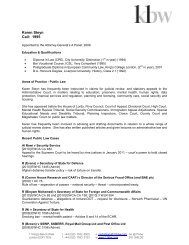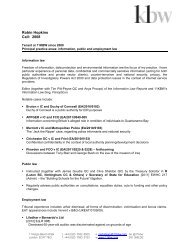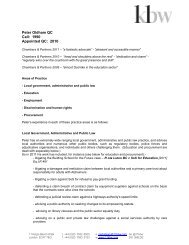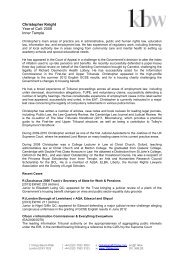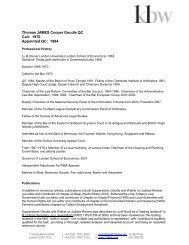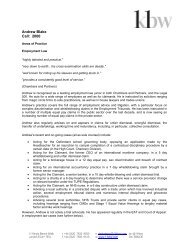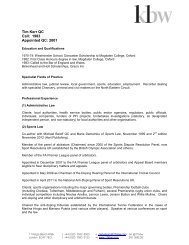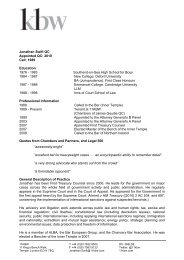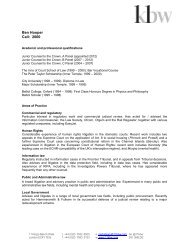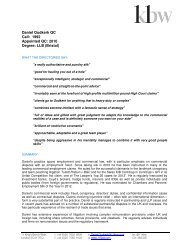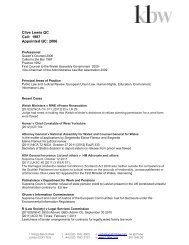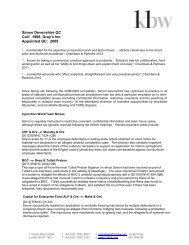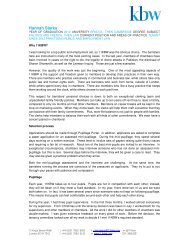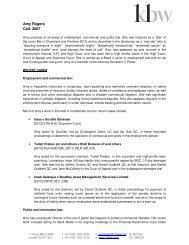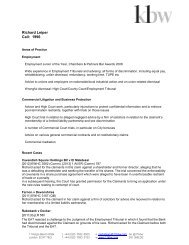THE PUBLIC SECTOR EQUALITY DUTY Joanne Clement - 11kbw
THE PUBLIC SECTOR EQUALITY DUTY Joanne Clement - 11kbw
THE PUBLIC SECTOR EQUALITY DUTY Joanne Clement - 11kbw
You also want an ePaper? Increase the reach of your titles
YUMPU automatically turns print PDFs into web optimized ePapers that Google loves.
27. In R (JG and MB) v Lancashire County Council [2011] EWHC 2295 (Admin), the<br />
claimants challenged the decision of full council to approve revenue budget proposals<br />
for three years, including a budget limit for adult social care services. The budget<br />
included two policy proposals – first, a policy to raise the eligibility threshold for<br />
access to adult social care services, and second, a policy to change how it charged<br />
for such services. The budget decision was taken at a meeting in February 2011. The<br />
approval by full council was to be subject to further consideration by the Cabinet<br />
Member. In March 2011 the Cabinet Member for Adult and Community Services<br />
approved policies in the budget including to raise eligibility thresholds for access to<br />
adult social care from “moderate” to “substantial” or “critical” (as assessed under<br />
FACS).<br />
28. The claimants argued that there had been a breach of the PSED because at the time<br />
the initial budget decision was taken, there had been no detailed assessment of the<br />
likely impact of the budget decision on the affected users of the relevant services.<br />
Kenneth Parker J rejected the challenge (relying on the protected characteristic of<br />
disability) in relation to the full council’s budget decision for essentially the following<br />
reasons (see [48]-[51]):<br />
(1) It was clear to those involved in approving the budget that disabled people would<br />
be adversely affected by budget reductions to adult social services. The potential<br />
impact was specifically identified for further investigation, and as part of that<br />
investigation there was put in train a series of consultations.<br />
(2) The approval of the Council’s overall budget did not constitute a final decision<br />
about what the Council’s policies would be or even about what sum of money<br />
would, in fact, be saved under each of the service proposals. It was obvious to<br />
the Council’s Members that the proposal to change the social care threshold<br />
would be implemented only after due regard had been paid to the need to<br />
promote equality of opportunity and to take steps to take account of disabled<br />
person’s disabilities.<br />
(3) The reality was that the decision-maker had taken a preliminary decision in<br />
relation to its budget, fully aware that the implementation of proposed policies<br />
would be likely to have an impact on the affected users, but had not committed<br />
itself to the implementation of specific policies within the budget framework until it<br />
had carried out a full and detailed assessment of the likely impact. There was<br />
nothing wrong, in principle, with such an approach and nothing inconsistent with<br />
the duties under the DDA.<br />
<strong>Joanne</strong> <strong>Clement</strong>, 11KBW<br />
t. 020 7632 8500 e. <strong>Joanne</strong>.<strong>Clement</strong>@<strong>11kbw</strong>.com<br />
10



